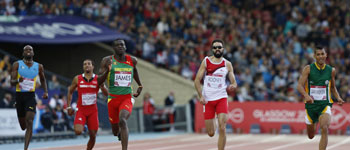 Wayde van Niekerk (far right) - our Kovsie hero at Commonwealth Games
Photo: Getty images |
UFS athlete Wayde van Niekerk proved himself as a world-class contender yet again. He grabbed silver in the 400 m sprint at the 2014 Commonwealth Games in Glasgow on Wednesday 30 July 2014.
Van Niekerk, who achieved a time of 44.68 sec in this race, took the lead at the first bend and held onto this position through the back straight before Kirani James of Granada pulled away over the final 150 m.
Lalonde Gordon of Trinidad and Tobago came third with a time of 44.78 sec.
This Commonwealth silver medal sees the Bloemfontein athlete’s magnificent year come full circle. Earlier this year, Van Niekerk broke the 15-year-old national record at the Diamond League meeting in New York with a time of 44.38 seconds.
Another star from the Free State, former Kovsie Kate Roberts, who took part in the mixed triathlon relay at the Commonwealth, also pocketed a silver medal. Her team mates were Richard Murray, Henri Schoeman and Gillian Sanders.
In addition, Neil Powell – Shimla Rugby alumnus from 2001 – played a central part in obtaining a gold medal at the Commonwealth Games. Powell is the coach of the Springbok 7s team that placed first at the Games in July 2014.
On a more local level, Kovsie alumnus and SA athlete, Johan Cronje, was nominated for the Sportsperson of the Year. You can vote for him by sending ‘SPORT 4’ via sms to 43043.